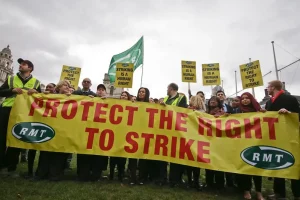The Winston Tunnel disaster is one of the most famous episodes in Ayn Rand’s benchmark novel, Atlas Shrugged’, and she described it in loving detail. Moving on from Car 7 of the Taggart Comet and the man who believed he had “a right” to a job, Rand next consigned to her fate ‘the woman in Roomette 6, Car no. 8, …. a lecturer who believed that, as a consumer, she had “a right” to transportation, whether the railroad people wished to provide it or not’.
As a sometime lecturer who, during the time I was employed as such, made great use of trains, I take a personal interest in this woman’s position. She was, no doubt, a reasonably-salaried person with a reputation to preserve, so I think we can assume that she had bought a ticket, So what were her rights? What indeed, should the rights of any citizen be, in respect of the train operators in the country in which they live? What, in essence, are train companies for?
Rand would have had no doubt about the answer. The companies exist to make money for their owners. That, indeed, was her answer to pretty well everything, and in this case her justification would be that only if the rail company had a sufficiency of satisfied customers would it make money, and that it would therefore be in its interest to transport people speedily and in comfort.
But in her view, it would not be obliged to do so, and if the company was so badly run that it went out of business, that was entirely as it should be. That was the way the system was supposed to work.
Rand, of course, still lived in her mind in a mythical world in which the economy relied on entrepreneurial geniuses who founded industries employing thousands, which they ran single-handed.and which they passed on to their heirs when they died. There, of course, there was a problem, because heirs are not necessarily up to the job. Dagney Taggart was a supremely competent railwaywoman, and it was because of her that the Taggart company limped on whilst many others went to the wall, but her brother James was supremely incompetent. If Dagny had died young, or had never been born, the company would have collapsed much sooner. As John Galt put it in his nationally broadcast rant (p. 384 in my copy of ‘Atlas Shrugged’) …
If an heir is equal to his money, it serves him, if not it destroys him. But you look on and you cry that money corrupted him. Did it? Or did he corrupt his money? Do not envy a worthless heir, his wealth is nor yours and you would have done no better with it. Do not think that it would have been distributed among you; loading the world with fifty parasites instead of one, would nor bring back the dead virtue which was the fortune. Money is a living power that dies without its root. Money will not serve the mind that cannot match it. Is this the reason why you call it evil?
Which is all very well, as far as the heirs themselves are concerned, but what about the rest? In the case of a railway, what about the potential passengers? What about the lecturer in Roomette 6?
The Randian answer, of course, would be that there would be another provider ready to step into the breach. For many industries that might work. If Henry Ford had been an incompetent maker of cars, there were plenty of others who would have supplied the demand. Or, to bring things more up to date, if Jeff Bezos had not founded Amazon, someone else would have founded something very similar or, better still, a multiplicity of companies run by people lacking his urge to monopoly might have filled the gap.
But railways are not like that. There is room in a country only for so much rail. In the US, a lot of room, admittedly, but in a country such as the UK, as we have seen in the battles over the routing of HS2, not a lot. Every new rail line involves the destruction of whatever was there before. Every existing railway line that does not run underground is a limitation on the freedom of those who live near it. It represents a line (quite literally) that they cannot cross, except at a limited number of predefined points. No country, however organised or disorganised, can afford to simply go on creating new railways as others fail – or if their owners arbitrarily decide that they do not like lecturers and will therefore not accept the money offered them by ladies such as the one whose existence so upset Ayn Rand.

UK railway workers protesting against new laws that would further restrict their right to take industrial action.
Of course, in the UK even the vast majority of those on the right wing of politics accept that, in the modern world, railways have a ‘public service responsibility’ that needs to be honoured. In fact, they go further. They want to see it enshrined in law. But only, of course, as far as the employees are concerned. They are to be forced to work, because the country cannot function properly if they do not.
But Avanti West Coast and Trans-Pennine Express can shred their services wholesale, without criticism from the right, as long as it is the workers and their unions they can blame. That their current woes are due to their lack of preparation for the post-Covid world and their failure to train enough staff, leaving those they have being required to work overtime in order just to keep things going, is ignored. Their management’s lack of competence and foresight goes unpunished. Unlike the Rand’s ‘worthless heirs’, whose money destroyed them, the CEOs and directors of those companies go happily on, paying themselves more than the Prime Minister.
